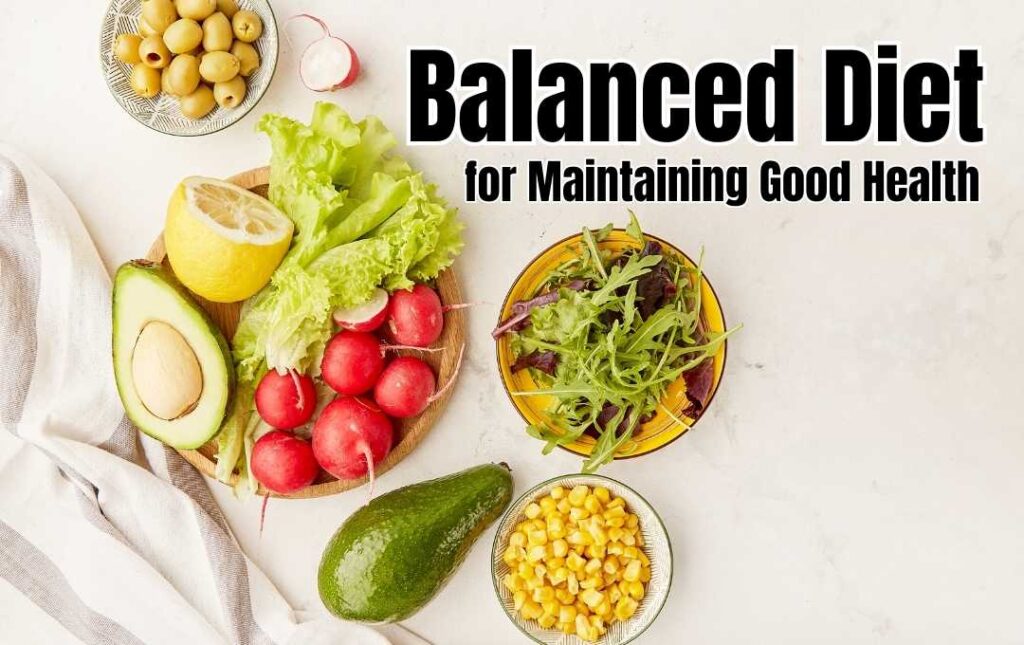A balanced diet is essential for overall well-being and good health. It provides the necessary nutrients that the body needs to function efficiently. A well-balanced diet helps in maintaining a healthy weight, reducing the risk of chronic diseases, and boosting energy levels.
In today’s fast-paced world, unhealthy eating habits and processed foods have become a norm. However, making mindful food choices can significantly impact one’s physical and mental health. In this blog, we will explore the importance of a balanced diet, its benefits, components, and how it contributes to maintaining good health.
Table of Contents
ToggleWhat is a Balanced Diet?
A balanced diet is a combination of different food groups in the right proportions to provide essential nutrients, vitamins, and minerals. It includes an adequate amount of carbohydrates, proteins, fats, vitamins, and minerals to keep the body functioning optimally.
Key Components of a Balanced Diet
- Carbohydrates – Provide energy to the body.
- Proteins – Essential for muscle growth and repair.
- Fats – Important for brain function and energy.
- Vitamins & Minerals – Boost immunity and support body functions.
- Fiber – Aids digestion and improves gut health.
- Water – Helps in hydration and detoxification.
Including all these elements in the right proportions ensures a diet for good health and prevents deficiencies.
Importance of a Balanced Diet for Good Health
1. Maintains a Healthy Weight
A balanced diet helps in controlling calorie intake and promotes weight management. Consuming nutrient-dense foods prevents excess fat accumulation and supports metabolism.
2. Reduces the Risk of Chronic Diseases
A diet rich in fruits, vegetables, whole grains, and lean proteins helps reduce the risk of diseases like diabetes, heart disease, and hypertension.
3. Boosts Energy Levels
Eating a variety of healthy foods ensures a steady supply of energy throughout the day, reducing fatigue and keeping you active.
4. Supports Mental Health
Good nutrition plays a crucial role in brain function. A diet rich in omega-3 fatty acids, vitamins, and antioxidants can improve memory, mood, and concentration.
5. Enhances Digestive Health
A fiber-rich diet aids digestion and promotes a healthy gut microbiome. Whole grains, fruits, and vegetables help prevent constipation and other digestive issues.
6. Strengthens Immunity
A well-balanced diet provides essential vitamins and minerals like Vitamin C, Zinc, and Iron, which are crucial for a strong immune system.
Key Nutrients in a Balanced Diet
1. Carbohydrates: The Primary Energy Source
Carbohydrates are the main source of energy for the body. Opt for complex carbs like:
- Whole grains (brown rice, quinoa, oats)
- Fruits and vegetables
- Legumes and beans
2. Proteins: Building Blocks of the Body
Proteins are essential for tissue repair and muscle growth. Include:
- Lean meats (chicken, turkey, fish)
- Dairy products (milk, yogurt, cheese)
- Plant-based proteins (lentils, tofu, nuts, seeds)
3. Healthy Fats: Essential for Brain Function
Fats are important for brain health and hormone production. Choose healthy fats like:
- Avocados
- Nuts and seeds
- Olive oil and coconut oil
- Fatty fish (salmon, tuna, mackerel)
4. Vitamins and Minerals: Vital for Overall Well-being
Vitamins and minerals support various bodily functions, such as:
- Vitamin A – Good for vision (found in carrots, sweet potatoes)
- Vitamin C – Boosts immunity (found in citrus fruits, bell peppers)
- Calcium – Strengthens bones (found in dairy products, leafy greens)
- Iron – Supports red blood cell production (found in spinach, lentils)
5. Water: The Elixir of Life
Hydration is crucial for bodily functions like digestion, temperature regulation, and detoxification. Aim to drink at least 8-10 glasses of water daily.
Tips to Maintain a Balanced Diet
1. Include a Variety of Foods
Eating different food groups ensures that you get a range of nutrients essential for a diet for good health.
2. Control Portion Sizes
Overeating can lead to weight gain. Use smaller plates and avoid eating in front of screens to control portions.
3. Limit Processed and Sugary Foods
Highly processed foods contain added sugars, unhealthy fats, and preservatives that can harm health. Opt for natural and whole foods instead.
4. Plan Your Meals
Meal planning helps in making healthier choices and prevents last-minute unhealthy food cravings.
5. Stay Hydrated
Drinking enough water throughout the day aids digestion, improves skin health, and prevents dehydration.
Common Myths About a Balanced Diet
Myth 1: Carbs are Bad for Health
Truth: Not all carbs are bad. Whole grains, fruits, and vegetables provide essential nutrients and fiber.
Myth 2: Fats Should Be Avoided Completely
Truth: Healthy fats like those found in avocados, nuts, and olive oil are beneficial for the body.
Myth 3: Skipping Meals Helps in Weight Loss
Truth: Skipping meals slows metabolism and can lead to overeating later in the day.
Myth 4: Protein is Only for Bodybuilders
Truth: Protein is essential for everyone as it supports muscle repair, immunity, and overall health.
Conclusion
Maintaining a balanced diet is key to a healthy and fulfilling life. It not only helps in weight management but also reduces the risk of diseases, boosts energy, and enhances mental health. By incorporating a variety of nutrient-dense foods, controlling portion sizes, and staying hydrated, you can achieve a diet for good health and improve overall well-being.
Following a balanced diet is not about strict limitations but about making smart food choices. Start today and take a step towards a healthier lifestyle!

